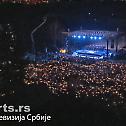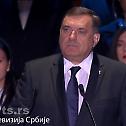Let’s hug our Fatherland! Our strength is only in unity!
Let’s hug our Fatherland! Our strength is only in unity, Patriarch Irinej said at the State observance of the NATO aggression
His Holiness the Serbian Patriarch Irinej spoke on March 24, 2019, in Nis at the beginning of the state ceremony marking the twentieth anniversary since the beginning of the NATO aggression upon Serbia.
With sounds of warning sirens and extinguishing lights, the central observance of the 20th anniversary of the beginning of the bombing was held. Remembering the victims, an honor was given to those who had suffered, with a message: “We will forgive if we can, but forget only if we are gone”. The Central marking of the 1999 NATO aggression began exactly at 19:45 when NATO airplanes dropped the first bombs.
Serbian Patriarch Irinej addressed the huge gathering (c. 20.000 people) and said that we remembered the most tragic days in our history, stressing that such a thing should not be repeated ever more and nowhere else in the world. He noted that the sounds of warning sirens were present in our lives even in our days. He pointed out that 78 days of bombing had been the days of fear.
His Holiness added that even more tragic was that we had been bombed by "our former allies and friends, who had transferred their alliance into an enmity against our people."
Serbian President Aleksandar Vucic emphasized that for the survival of the Serbian people an important requirement was that we should never forget the lost lives of anyone, especially of the murdered children. "Everything else can be repaired," the President added.
The Chairman of the Presidency of Bosnia and Herzegovina Milorad Dodik addressed the gathering saying that NATO by bombing Serbia had committed a major crime against the Serbian people, which actually had prolonged the previous bombing of Republika Srpska.
Commemorative events around the country have marked for the two decades the launch of the NATO aggression against the FRY.
During the 78 days of NATO aggression, between 1,200 and 2,500 people were killed.
The decision to bomb the then Federal Republic of Yugoslavia was brought for the first time in history without any approval of the UN Security Council; the order was issued by NATO Secretary General Javier Solana to the then commander of the Allied Forces, US General Wesley Clark.
Nineteen Alliance countries began bombardment from ships in the Adriatic, from four aircraft bases in Italy, supported by strategic bombers flying from bases in Western Europe, and later from the United States.
Barracks and units of the air defense of the Army of the FRY in Batajnica, Mladenovac, Pristina and elsewhere, were attacked first.
There is almost no city in Serbia that, during the 11 weeks of the attack, was not a target of the NATO forces at least several times.
The bombing destroyed and damaged 25,000 housing units, 470 km of roads whereas 595 kilometers of railroad were disabled. 14 airports, 19 hospitals, 20 health centers, 18 kindergartens, 69 schools, 176 cultural monuments and 44 bridges were damaged, while 38 were destroyed.





